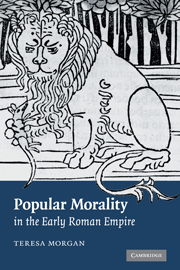Book contents
- Frontmatter
- Contents
- Preface
- List of illustrations
- List of tables
- List of abbreviations
- 1 Introduction
- PART ONE
- PART TWO
- PART THREE
- Conclusion
- Appendix 1 The political and literary connections of Babrius
- Appendix 2 The definition of a miscellany
- Appendix 3 Popular morality and philosophical doctrine
- List of papyri
- Bibliography
- Index
Conclusion
Published online by Cambridge University Press: 27 October 2009
- Frontmatter
- Contents
- Preface
- List of illustrations
- List of tables
- List of abbreviations
- 1 Introduction
- PART ONE
- PART TWO
- PART THREE
- Conclusion
- Appendix 1 The political and literary connections of Babrius
- Appendix 2 The definition of a miscellany
- Appendix 3 Popular morality and philosophical doctrine
- List of papyri
- Bibliography
- Index
Summary
He lives long who lives well.
English proverbThe aim of this study has been to recover an aspect of the mentality of people within Roman society of whose thought world we otherwise know little, and to see how it relates to the mentality of those of whom we know rather more. We have investigated what moral agents from a wide spectrum of social backgrounds thought made their lives good or bad, morally successful or unsuccessful. Such a study touches on many arenas of Roman life and Roman historiography, from politics, social and economic activities, to religion, the home and aspects of high culture like philosophy and literature. At the same time it looks at the Roman world from its own angle, so I have tried to establish something of how ethical agents saw their environment – what their horizons were, how they rated what they did or had, and how they made decisions about how to live.
We have seen how against a relatively optimistic picture of the morality of the metaphysical world and nature, popular wisdom viewed human life as physically, socially and morally fragile and prone to fail. We have explored what our sources regard as the main causes of strife between human beings and its main antidotes, some of which are communal, some individualistic, and we saw how the tensions, limitations and intrinsic weaknesses of these antidotes worried them.
- Type
- Chapter
- Information
- Popular Morality in the Early Roman Empire , pp. 324 - 325Publisher: Cambridge University PressPrint publication year: 2007



